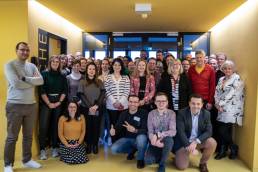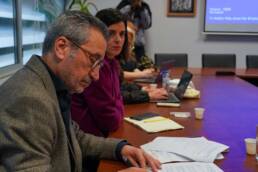Last week, Bremen University of Applied Sciences (HSB) held a Staff Week with participation of members of all STARS EU partners. The German institution is also running three Blended Intensive Programmes (BIP) independently for the first time. These activities are important building blocks on the way to becoming a European university.
The Staff Week focused on digital working methods at the participating STARS EU universities. Close to 50 experts on e-learning, digital campus and Erasmus Without Paper, as well as teaching staff and researchers from the Thematic Interest Group (TIG) “Digital Transformation“ came together to discuss this complex topic. The aim is to gradually establish a joint digital campus.
The launch of the three Blended Intensive Programmes (BIP) is an important test for the further development of the internationalisation of HSB‘s curricula. Several STARS EU partner universities are involved in these programmes.
The three projects at a glance:
- “Startup Blended Intensive Programme”, School of International Business with Stephan Form together with the University of La Laguna (Spain), Silesian University in Opava (Czech Republic), Polytechnic Institute of Bragança (Portugal), University West (Sweden) and the Hanze University of Applied Sciences at Groningen (Netherlands)
- “Sustainable Urban Building Intervention”, School of Architecture, Civil and Environmental Engineering with Maria Clarke (Architecture) and Thomas Rauscher (Civil Engineering), together with the Polytechnic Institute Bragança (Portugal) and Cracow University of Technology (Poland).
- “Embedded Systems for Mobile Robots”, School of Electrical Engineering and Computer Science, under the responsibility of Martin Hering-Bertram and supported by Sören Peik, together with the Polytechnic Institute Bragança (Portugal) and the Hanze University of Applied Scioences (Netherlands).
In all projects, the students initially start in online groups and work together on preparatory tasks. In the projects from the School of Architecture, Civil and Environmental Engineering and the School of Electrical Engineering and Computer Science, a total of 15 students from each of the partner universities will come to Bremen for a week later in the semester to work on the practical part of their module and prepare the final presentation.
The practical part of the project of the School of International Business will take place at Groningen with the participation of a total of 25 students from the partner universities involved in these BIP.
The projects are worth six credits. Lecturers from all participating universities are involved with their own contributions and in supervising the group work.
Related Posts
February 6, 2026
Celebrate the International Day of Women and Girls in Science with STARS EU
The alliance demonstrates its commitment to full and inclusive participation of…
February 3, 2026
Bragança Polytechnic University and University West strengthen their strategic cooperation in research and doctoral training within STARS EU
The meeting addressed the implementation of joint doctorates and the connection…
January 30, 2026
Education to address new challenges, focus of the third STARS EU Annual Conference
The next event will take place in March 2026 at the Silesian University in…




